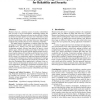10 search results - page 1 / 2 » Preventing Overflow Attacks by Memory Randomization |
ISSRE
2010
IEEE
13 years 2 months ago
2010
IEEE
Buffer overflow is known to be a common memory vulnerability affecting software. It is exploited to gain various kinds of privilege escalation. C and C++ are very commonly used to ...
SOCIALCOM
2010
12 years 11 months ago
2010
Protecting the integrity of software platforms, especially in unmanaged consumer computing systems is a difficult problem. Attackers may attempt to execute buffer overflow attacks ...
BIRTHDAY
2012
Springer
12 years 2 days ago
2012
Springer
We propose a new countermeasure to protect block ciphers implemented in leaking devices, at the intersection between One-Time Programs and Boolean masking schemes. First, we show t...
ISCA
2010
IEEE
13 years 9 months ago
2010
IEEE
Phase change memory (PCM) is an emerging memory technology for future computing systems. Compared to other non-volatile memory alternatives, PCM is more matured to production, and...
ASPLOS
2008
ACM
13 years 6 months ago
2008
ACM
Memory errors are a notorious source of security vulnerabilities that can lead to service interruptions, information leakage and unauthorized access. Because such errors are also ...

